牛津小学英语6A_知识要点汇总
牛津6A基础知识汇总

牛津6A基础知识汇总Unit 1单词1:always总是 2:question问题 3:ask问请求要求 4:mean意思是意指 5:must必须应当 6:should应当应该7:shouldn’t=should not不应该 8:pick拾采9:public公共的公众 10:sign标志告示牌子 11:cousin堂(表)兄弟姐妹 12:danger 危险 13:away(离)开 14:grass草地草 15:bird鸟 16:cage笼子 17:quiet安静的 18:noise噪声喧闹声 19:smoke吸烟20:litter乱丢杂物 21:park停放(汽车)22:touch触摸 23:suddenly突然(地) 24:something某事某物 25:note钞票纸币26:around周围在附近 27:nearby附近的 28:quickly快地29:keeper看守人 30:point 指 31:fine罚款短语1. four years old 四岁2. ask Ben some questions 问Ben 一些问题3. go in 进去4. stay away 远离5. keep off 远离6. make noise 发出(喧闹)的声音7. talk about 讨论 8. public signs 公共标志9. No smoking 禁止吸烟 10. No littering 禁止乱扔杂物11. No parking 禁止停车 12. Do not touch 禁止触摸13. Danger! 危险 14. No eating or drinking 禁止吃喝东西15. Keep off the grass 远离草地 16. take a walk 散步17. Be quiet 保持安静 18. be back home from the zoo 从动物园回家19. a ten-yuan note 一张十元纸币 20. say to 对……说21. pick up 拾起 22. come up 上来23. point to 指向 24.look around环顾四周25. fine ¥10 罚款10元 26. birds’cage鸟笼27.walk on the grass 在草地上行走 28.ask sb about sth 问某人关于某事29.no one nearby 附近没有人 30.give me ten yuan=give ten yuan to me 给我十元 31.shake one’s head 摇头句型1:He is asking Ben some questions. 他正在问本一些问题。
牛津小学英语6A知识点整理

Unit 1 一词组和日常用语No smoking 禁止吸烟No littering 禁止乱扔杂物No parking 禁止停车Do not touch 禁止触摸Danger!危险No eating or drinking 禁止吃喝keep off the grass 禁止践踏草坪Be quiet 保持安静keep quiet保持安静his cousin 他的表弟on the wall在墙上go in入内a lot of questions许多问题ask sb. some questions about sth.问某人一些有关某事的问题only four years old仅仅四岁a lot of public signs许多公共标志mean different things意味着不同的意思walk on the grass在草地上走make noise发出喧闹的声音know a lot about public signs知道许多有关公共标志的知识the sign on the birds’ cage在鸟笼上的标志climb the tree爬树stay away from the building远离那座建筑物at home在家give me ten yuan给我十元take a walk 散步take photos拍照see something on the grass看见草地上有些东西a ten yuan note一张十元纸币look around看看四周walk to the note走向纸币pick it up 拣起它pick up your pencil拣起你的铅笔come up to him来到他面前a park keeper一个公园管理员point to a sign on the grass指着草地上的一个标志the boy in the green sweater穿着绿色毛衣的男孩shake one’s head摇头on the Internet在网上二.句子1. What does this sign mean? It means ‘No smoking’.It means you shouldn’t smoke.这个标志什么意思?它意味着“禁止吸烟”。
牛津英语6A模块单元知识点总结
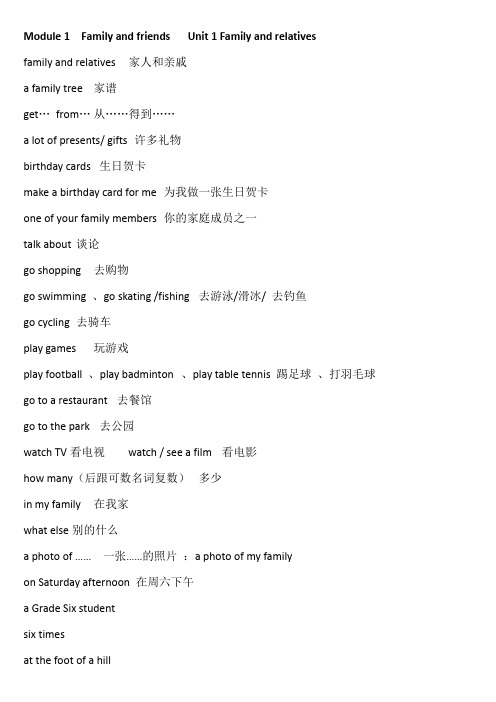
Module 1 Family and friends Unit 1 Family and relativesfamily and relatives 家人和亲戚a family tree 家谱get…from…从……得到……a lot of presents/ gifts 许多礼物birthday cards 生日贺卡make a birthday card for me 为我做一张生日贺卡one of your family members 你的家庭成员之一talk about 谈论go shopping 去购物go swimming 、go skating /fishing 去游泳/滑冰/ 去钓鱼go cycling 去骑车play games 玩游戏play football 、play badminton 、play table tennis 踢足球、打羽毛球go to a restaurant 去餐馆go to the park 去公园watch TV看电视watch / see a film 看电影how many(后跟可数名词复数)多少in my family 在我家what else别的什么a photo of ……一张……的照片:a photo of my familyon Saturday afternoon 在周六下午a Grade Six studentsix timesat the foot of a hillthis --- these ; that --- those;parents , daughter, son, uncle, aunt频率副词:always 、usually、often、sometimes、never 在be动词后,助动词后,情态动词后,实义动词Also “也”,用于句中;too“也”,用于句末;A lot of = lots of “许多,大量”,修饰可数名词复数、不可数名词Eg. a lot of / lots of water ; a lot of / lots of apples;。
6A上海牛津英语六年级第一学期重点词组和句型
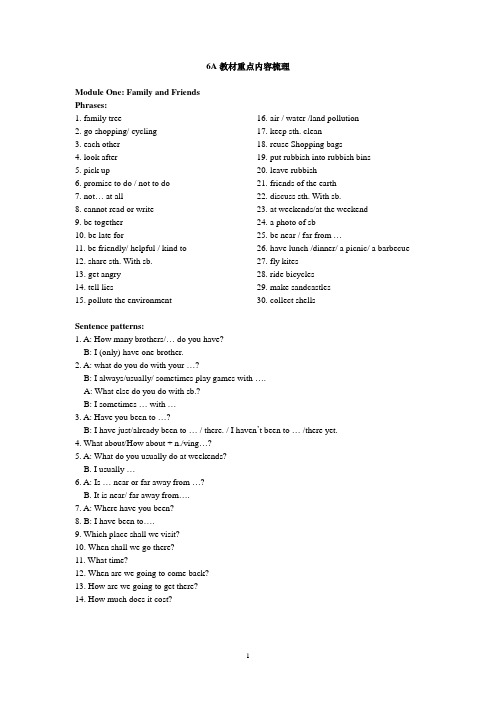
6A教材重点内容梳理Module One: Family and FriendsPhrases:1. family tree2. go shopping/ cycling3. each other4. look after5. pick up6. promise to do / not to do7. not… at all8. cannot read or write9. be together10. be late for11. be friendly/ helpful / kind to12. share sth. With sb.13. get angry14. tell lies15. pollute the environment 16. air / water /land pollution17. keep sth. clean18. reuse Shopping bags19. put rubbish into rubbish bins20. leave rubbish21. friends of the earth22. discuss sth. With sb.23. at weekends/at the weekend24. a photo of sb25. be near / far from …26. have lunch /dinner/ a picnic/ a barbecue27. fly kites28. ride bicycles29. make sandcastles30. collect shellsSentence patterns:1. A: How many brothers/… do you have?B: I (only) have one brother.2. A: what do you do with your …?B: I always/usually/ sometimes play games with ….A: What else do you do with sb.?B: I sometimes … with …3. A: Have you been to …?B: I have just/already been to … / there. / I haven’t been to … /there yet.4. What about/How about + n./ving…?5. A: What do you usually do at weekends?B. I usually …6. A: Is … near or far away from …?B. It is near/ far away from….7. A: Where have you been?8. B: I have been to….9. Which place shall we visit?10. When shall we go there?11. What time?12. When are we going to come back?13. How are we going to get there?14. How much does it cost?Module Two: Places and Activities Phrases:1. a bank clerk2. a shop assistant3. put out fires4. cook food5. make our city a safe place6. look at7. listen to8. arrive at9. have tea10. at the entrance11. on the ground/ first floor12. on the open day13. at half past eight in the morning14.First,../ Next,…/Then,…/After that,…/Finally, …15.take photos16. by ferry/ by underground/ on foot17. on the bus 18. go to school19. a lot of/ some/ a few20.live near/far away from school21.an advertisement board22. light rail23. a department store24. a housing estate25. a police station26. half an hour27. wait for28. walk on the grass29. keep quiet30. run across the road31. pick the flowers32. turn left/right33. on the right/left34. in the middle35. go upstairsSentence patterns:1.A: Would you like to be a/an…?B: Yes, I would.//No, I wouldn’t.A: Why?/Why not?B: I would /wouldn’t like to be a/an…because I…2.A: What would you like to be?B: I would like to be…3.A: Do you live near or far away from …?B: I live near/far away from ….A: How do you go to school?B: I go to school by…/on foot.A: How long does it take?B: It takes …4.A: How long does it take you to get to…?B: It takes me about…to get there.5.A: What does Simon see when he is walking to school?B: Simon sees ...when he is walking to school.6. What does this sign mean?7. We must not eat or drink./Don’t eat or drink.8. We must …9. A: Which escalator must we use?B: We must use the one in the middle.Module Three: Food and Drink phrases1. fried cabbage/chicken wings2. steamed prawns with garlic3. boiled eggs4. a shopping list5. at the vegetable stall6. in the frozen food section7. in the market/supermarket8. have a picnic9. a bottle of jam10. a packet of nuts11. a slice / slices of 12. an unhealthy diet13. do exercise14. live in the countryside15. stay with sb.16. plenty of / a lot of17. a little/ some18. my favourite breakfast19. too much spicy food20. eating habits21.the food pyramidSentence patterns:1.A: What would you like for dinner tonight?B: I’d like … for dinner.A: What kind of … would you like?Would you like … or …?B: I’d like…2.A: Have you bought any…?B: Yes, I’ve bought some…A: Where did you buy it/them?B: In the market, at the…stall/in the…section.A: How much was it/were they?B: It was /They were…yuan.3.A: Shall we buy some soft drinks?B: Ok./ That’s a good idea.4.Let’s buy some bread and a bottle of jam.Let’s go to the supermarket to buy some food and drink for the picnic.5.A: Would you like some…?B: No, thanks / yes, please6.A: Why do you like…?B: I like it/them because it’s/they’re sweet/delicious/tasty/spicy.7.A: Why not?B: I don’t want … because it is too ….8.A: May I have some …, please?B. Ok/ Sure/ All right/ Yes, you may. Here you are.//NO, you may not./ I’m afraid you can’t..9.A: How much sugar do we need every day?B: We need a little sugar every day.10.A: Which one was healthier/less healthy?B: …’s diet was healthier than/less healthy than/as healthy as/as unhealthy as …’s diet.11.How much … do we need?12.What do you usually have for breakfast/ lunch /dinner?13.A: What did you have for breakfast yesterday?。
牛津版小学英语6A知识点归纳总复习
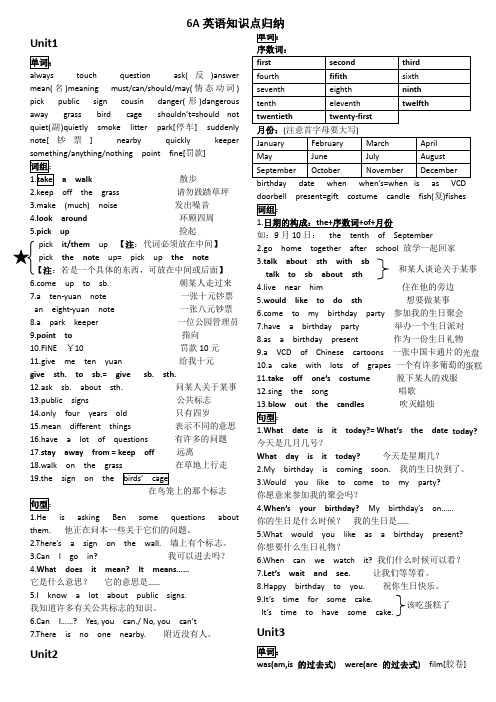
Unit1always touch question ask(反)answer mean(名)meaning must/can/should/may(情态动词) pick public sign cousin danger(形)dangerous away grass bird cage shouldn ’t=should not quiet(副)quietly smoke litter park[停车] suddenly note[钞票] nearby quickly keeper point fine[罚款]a walk 散步2.keep off the grass 请勿践踏草坪3.make (much) noise 发出噪音4.look around 环顾四周5.pick up 捡起pick it/them up 【注:代词必须放在中间】 pick the note up= pick up the note 注:若是一个具体的东西,可放在中间或后面】 e up to sb. 朝某人走过来 7.a ten-yuan note 一张十元钞票 an eight-yuan note 一张八元钞票 8.a park keeper 一位公园管理员 9.point to 指向10.FINE ¥10 罚款10元 11.give me ten yuan 给我十元 give sth. to sb.= give sb. sth.12.ask sb. about sth. 问某人关于某事 13.public signs 公共标志 14.only four years old 只有四岁15.mean different things 表示不同的意思 16.have a lot of questions 有许多的问题 17.stay away from = keep off 远离18.walk on the 在草地上行走 19.the sign on the在鸟笼上的那个标志1.He is asking Ben some questions about them. 他正在问本一些关于它们的问题。
牛津小学英语6A-知识要点汇总

牛津小学英语 6A 知识重点Unit 1单词:publicsignmeancousin堂(表)兄弟姐妹 question问题 公共的标记意思是bin 箱子 danger 危险 must 一定 away (离)开 grass 草 off 离开,(离)开 cage 笼子 quiet 寂静 noise 噪声 know 知道 conversation 对话 complete 完整的 smoke 抽烟 litter 乱丢 cycle 骑自行车 back 回suddenly 忽然地 note 钞票,纸币match 竞赛 around 在四周,四周 nearby 邻近的keeper 看守人point 指出fine 罚款rubbish 废物 ,词组:1. 严禁泊车 No parking2.严禁抽烟 No smoking3. 严禁吃喝 No eating or drinking4.严禁踩踏 keep off the grass 5. 严禁乱丢杂物 No littering6. 严禁触摸 Do not touch7. 寂静 Keep / Be quiet8.朝他走去 come up to him9.罚款 5元FINE ¥510.在鸟笼上 on the birds ’cage 11. 指向 point to12.只有四岁 only four years old13. 有很多问题 have a lot of questions14.问问题ask question15. 公共标记 public signs16. 严禁骑车 No cycling 17. 在危险中 in dange r 18.制造噪音 make noise 19. 漫步 take a walk20. 远离 stay away from21. 一个公园看守员a park keeper 22.环视 look around 23. 在草地上走 walk on the grass24. 进去 go in25. 建筑物上的标记 the sign on the building句型:1. 这个标牌是什么意思What does this sign mean它意指“危险”。
上海版牛津英语6A知识点整理
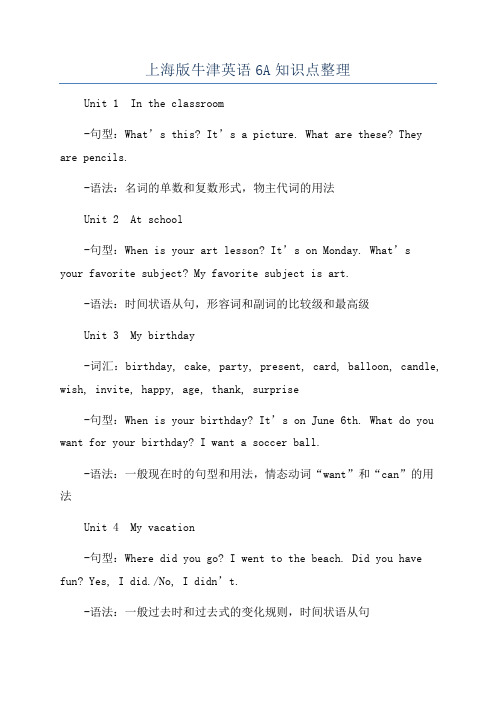
上海版牛津英语6A知识点整理Unit 1 In the classroom-句型:What’s this? It’s a picture. What are these? They are pencils.-语法:名词的单数和复数形式,物主代词的用法Unit 2 At school-句型:When is your art lesson? It’s on Monday. What’syour favorite subject? My favorite subject is art.-语法:时间状语从句,形容词和副词的比较级和最高级Unit 3 My birthday-词汇:birthday, cake, party, present, card, balloon, candle, wish, invite, happy, age, thank, surprise-句型:When is your birthday? It’s on June 6th. What do you want for your birthday? I want a soccer ball.-语法:一般现在时的句型和用法,情态动词“want”和“can”的用法Unit 4 My vacation-句型:Where did you go? I went to the beach. Did you have fun? Yes, I did./No, I didn’t.-语法:一般过去时和过去式的变化规则,时间状语从句Unit 5 Animals and plants-词汇:animal, plant, kangaroo, elephant, lion, tiger, monkey, panda, parrot, snake, butterfly, grass, flower, tree, forest-句型:What can parrots do? They can fly and talk. What are pandas’ favorite food? Their favorite food is bamboo.-语法:情态动词“can”的用法,描述事物的特征和能力Unit 6 In the garden-词汇:garden, vegetable, tomato, carrot, radish, onion, potato, cucumber, cabbage, turnip-句型:What can you see in the garden? I can see tomatoes, carrots, and onions. What’s your favorite vegetable? My favorite vegetable is cucumber.-语法:复数形式的可数名词Unit 7 We’re going to the zoo-词汇:zoo, lion, panda, monkey, kangaroo, tiger, bear, elephant, snake, ostrich, tortoise-句型:What are you going to do? We’re going to the zoo. Can snakes fly? No, they can’t.-语法:be going to表示将来的句型和用法,否定词can’t的用法Unit 8 On the farm-词汇:farm, pig, horse, sheep, chicken, cow, duck, dog, cat, lamb, chick, puppy, kitten-句型:How many pigs are there? There are three pigs.What’s your favorite farm animal? My favorite farm animal is a horse.-语法:数词和名词的复数形式Unit 9 At the supermarket-词汇:supermarket, mall, shop, store, grocery, bread, egg, cheese, juice, milk, butter, tea, coffee, sugar, salt-句型:What do you want to buy? I want to buy some bread. How much is the milk? It’s twenty yuan.-语法:不可数名词的用法,询问物品价格的句型和用法Unit 10 Clothes-词汇:clothes, hat, shirt, T-shirt, dress, skirt, pants, shorts, socks, shoes, coat, gloves, watch, scarf-句型:What are you wearing? I am wearing a hat, a T-shirt, and shorts. How much are the shoes? They are fifty yuan.-语法:指示代词和指示形容词,描述衣物的材料和颜色Unit 11 Our body-词汇:body, head, face, hair, eye, nose, mouth, ear, hand, arm, leg, foot, finger, toe-句型:What can you do with your hands? I can write and draw with my hands. How many fingers do you have? I have ten fingers.-语法:名词所有格的用法,询问数量和回答数量的句型以上是上海版牛津英语6A教材中的部分重要知识点的整理。
牛津小学英语6A知识梳理

牛津小学英语6A知识梳理词汇和句型Unit 11. No smoking 禁止吸烟2. No littering禁止扔杂物3. No parking禁止停车4. No cycling禁止骑自行车5. No eating and drinking 禁止吃喝6.keep off the grass不接近草坪7.Be quiet保持安静8. Do not touch不要摸9. a lot of \ a lot大量的;许多10. public signs公共标志11. on the wall在墙上12. stay away from…远离……13.walk on the grass在草地上走14. the bird’s cage鸟笼15. make noise发出噪音16. take a walk散步17. a ten-yuan note 一张十元的钞票18. look around四周看19. pick up捡起20. come up to sb. 走近某人What does it/this/that mean? It means you/we must/should/shouldn’t…There are a lot of signs here. They mean different things.Unit 21. a new student in Ben’s class本班上的一位新学生2. go home together一起回家3. after school放学以后4. talk about谈论有关……5. come soon 快到了6. the third of March 三月三日7. on the twenty-second of July在七月二十二日8. on the 18th of October 在十月十八日9. your birthday你的生日10. Let’s wait and see让我们等一下看看11. blow out the candles吹灭蜡烛12. as a birthday present作为生日礼物13. birthday cake生日蛋糕14. come to my birthday party来参加我的生日聚会15. have a birthday party举办生日聚会16. a VCD of Japanese cartoons一张日本卡通光盘17. open the door 开门18. make a birthday card 做一张生日贺卡19. take off脱下20. blow out 吹灭21. a piece of paper一张纸22. fold it in half把它对折in the bayWhen’s your birthday? My birthday’s on …What would you like as a birthday present? I’d like …What date is it today? It’s the 16th of October. My birthday is coming soon.Would you like to come to my birthday party?Would you like a VCD of Japanese cartoon, too?Let’s wait and see.Unit 32. all the students所有的学生3. be excited非常激动4. very exciting非常令人兴奋5. look for寻找6. a running race一场赛跑7. let me see让我看看8. a moment ago / just now刚才9. on the ground在地上10. pick them up for me帮我把它们捡起来11. in front of 在……前面12. next to 紧靠……旁边13. a pair of glasses一副眼镜(单数)14. a roll of film一卷胶卷(单数)15. a diary\ three diaries 一本日记、三本日记16. a pair of earphones一副耳机(单数)17. listen to music 听音乐18. yesterday evening 昨天晚上19. under the table在桌子下面20. try to remember试图记住21. in the red box在红色盒子里22. close your eyes 闭上你的眼睛23. play a game 玩游戏24. with your classmates 和你的同学们25. over there 在那边26. in my school bag 在我的书包里It is Sports Day. Let me see.Can I have them, please? Can you pick them up for me, please? It isn’t there now. It was there a moment ago.Where are my /your …? They’re next to/in front of/on/in/between the …They aren’t there now. They were there a moment ago.Unit 51. National Day(国庆日)2. the National Day holiday(国庆假期)3. last week/ last year上个星期/去年4. after the holiday(假期后)5. go to school early(很早上学)/ early -- late6. in the school playground(在学校操场上)7. before class(上课前)/ before -- after8. watch a film with my parents(和我的父母一起去看电影)/ watched9. a funny cartoon(一部有趣的卡通片)/ funny(形容词)10. visit a farm with my family(和我的家人一起参观农场)/ visited11. on the farm(在农场里)12. water trees(浇树)/ watered13. pull up carrots(拔胡萝卜)/ pulled up14. milk cows(挤牛奶)/ milked15. That was fun!(那是件有趣的事!)/ fun(名词)16. collect eggs(收集鸡蛋)/ collected17. fruit trees(果树)18. pick a lot of oranges(摘许多橘子)/ picked19. taste them(品尝它们)/ tasted20. Wonderful!(太好了!)21. go to the farm(去农场)/ went22. at the weekends(在周末)23. watch cartoons(看动画片)/ watched24. visit the zoo(参观动物园)/ visited25. listen to music(听音乐)/ listened26. play football(踢足球)/ played27. play volleyball(打排球)/ played28. clean the house(打扫房子)/ cleaned29. visit Liu Tao’s grandparents(拜访刘涛的祖父母)/ visited30. camping trip(野营旅行)31. at a camp(在一个营地上)32. walk in the mountains(登山)/ walked33. cook a lot of food(做许多食物)/ cooked34. play a lot of games(玩许多游戏)/ played35. go camping(去野营)/ went36. plant flowers(种花)/ planted37. have a good time(玩得很高兴)/ hadUnit 61.get very excited 变得非常兴奋e after 在……之后到来3.New Year's Day 元旦4.on New Year's Day 在元旦5.at Christmas 在圣诞节6.go to parties 去参加聚会7.have a big lunch 吃一顿丰盛的午餐8.at Spring Festival 在春节9.What do people usually do at Spring Festival?人们通常在春节干什么?10.visit their relatives and friends 拜访他们的亲戚和朋友11.eat lots of delicious food吃许多美味的食物st Spring Festival 上个春节13.of course 当然14.my favourite holiday 我最喜爱的节日15.in October 在十月16.dress up in costumes 用戏服装扮st Halloween 去年万圣节18.Mid-Autumn Festival 中秋节19.eat moon cakes 吃月饼20.play with lanterns 玩灯笼21.watch the moo赏月n22.the beautiful moon 漂亮的月亮23.on different holidays 在不同的节日st year 去年25.at Easter 在复活节26.from…to从……到………27.listen to him 听他讲28.in the grass 在草丛中29.a popular holiday一个流行的节日30.in China 在中国31.in January or February 在一月或二月32.eat rice dumplings 吃粽子33.like to play with lanterns喜欢玩灯笼34.watch the dragon boat races 观看龙舟比赛Christmas is coming.My favourite holiday is Halloween. What’s your favourite holiday?When’s …? It’s in …What do people usually do at …? They …Did you … last …? Yes, I did. / No, I didn’t.Unit 71.on the 25th of Dece在12月25日mbe2.Christmas Day 圣诞日3.on Christmas Day 在圣诞日4.im's family 吉姆一家人J5.in his grandparent's house在他爷爷奶奶的房子里6.Christmas trees 圣诞树7.the presents under the Christmas tree在圣诞树下的礼物8.so many 这么多9.from grandmother 来自祖母10.open it for me 为我打开它11.like drinking tea 喜欢喝茶12.be from 来自13.Christmas presents 圣诞礼物14.at Jim's house 在吉姆家15.draw and write in the diary 在日记上画和写16.go to the supermarket 去超市17.sit at the back of the bus 坐在公共汽车的后面18.get off 下车19.the seat in front of me 在我前面的座位20.the woman beside him 在他旁边的妇女21.walk to the driver 走向驾驶员22.after lunch 午餐后23.You are welcome. 不用谢24.next to the blackboard 紧靠黑板25.get many presents on Christmas Day 在圣诞节得到很多礼物26.at the back 在……后部27.write his diary 写他的日记28.under the seat 在座位下面29.open the presents 打开礼物Whose …is it/ are they? It’s / They’re mine/yours/his/hers/ours.This one is from Grandpa. Open it for me, please.Who are they from? They’re from Grandpa and Grandma.语法分析1、序数词序数词的构成是在以之相对应的基数词词尾加th,个别例外:◆one – first two—second three—thirdfive—fifth eight—eighth nine—ninthtwelve – twelfth◆以ty结尾的,先变y为i,加thforty—fortieth◆缩写形式1st 2nd 3rd 4th 5th 22nd 31st2、一般过去时一般过去时表示过去某个时间发生的动作或存在的状态,常和表示过去的时间状语连用。
小学牛津英语6A知识点归纳

6A知识点归纳Unit1 Public signs1. Jack is only four years old but he always has a lot of questions. 杰克只有四岁,但他总是有许多的问题。
1) only表示“仅仅,只有”,这里用来强调Jack的年龄。
He is only child in this family. 他是这家唯一的孩子。
2) always“一直,总是”,常和一般现在时连用,放在play, eat, swim等实义动词前。
My mother always gets up at six in the morning. 我母亲总是早上六点钟起床。
3) a lot of “许多,大量的”,同义词组:lots of。
例如:There are a lot of/ lots of birds in the tree.树上有许多鸟。
2. He is asking Ben some questions about them. 他正在问本一些关于那些标志的问题。
1) 这句话用的是现在进行时,进行时的结构是:sb.+be+doing。
例如:They are watching TV. 他们正在看电视。
2) about表示“关于”,用来解释说明问的是那方面的问题。
Do you have any books about animals? 你有关于动物的书吗?3) ask sb. about sth. 问某人有关某事。
例如:I ask him about my work. 我问他关于我工作的事。
They ask me a lot of questions about Maths. 他们问我许多关于数学的问题。
3. They mean different things. 它们表示不同的意思。
1) different“不同的”,是same的反义词。
different是指两者以上才能构成不同的,所以其后要跟可数名词的复数。
牛津6A知识点复习
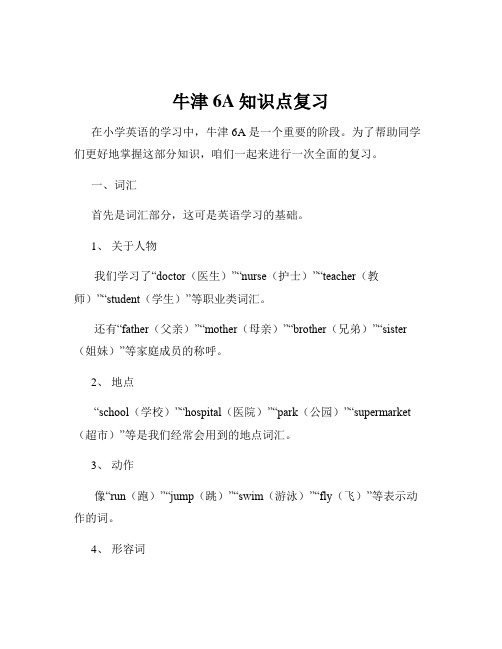
牛津6A知识点复习在小学英语的学习中,牛津 6A 是一个重要的阶段。
为了帮助同学们更好地掌握这部分知识,咱们一起来进行一次全面的复习。
一、词汇首先是词汇部分,这可是英语学习的基础。
1、关于人物我们学习了“doctor(医生)”“nurse(护士)”“teacher(教师)”“student(学生)”等职业类词汇。
还有“father(父亲)”“mother(母亲)”“brother(兄弟)”“sister (姐妹)”等家庭成员的称呼。
2、地点“school(学校)”“hospital(医院)”“park(公园)”“supermarket (超市)”等是我们经常会用到的地点词汇。
3、动作像“run(跑)”“jump(跳)”“swim(游泳)”“fly(飞)”等表示动作的词。
4、形容词“big(大的)”“small(小的)”“tall(高的)”“short(矮的)”“fat (胖的)”“thin(瘦的)”等形容词可以用来描述事物的特征。
要记住这些词汇,不能死记硬背,可以通过图片、句子或者实际场景来帮助记忆。
二、语法语法是英语学习中的重点和难点。
1、一般现在时这是我们经常会用到的时态,表示经常发生的动作或存在的状态。
比如:“I go to school every day(我每天去上学。
)” 主语是第三人称单数时,动词要发生变化,像“He likes playing football(他喜欢踢足球。
)”中的“like”就要变成“likes”。
2、现在进行时表示正在进行的动作,结构是“be +动词的现在分词”。
例如:“I am reading a book now(我现在正在读书。
)”3、一般过去时用来描述过去发生的事情,动词要用过去式。
像“I went to Beijing last year(我去年去了北京。
)”4、名词的单复数一般情况下,直接在名词后面加“s”,比如“book books”。
但有些名词的复数形式是不规则的,比如“man men”“woman women”“child children”。
牛津6A知识梳理

①It isn’t there now.②It was there a moment ago.
③They aren’t there now.④They were there a moment ago.
⑤Where are my/your...? They’re on/in/near/behind/under...
26 meet friends and relatives和亲戚朋友见面
27 a holiday full of love and joy一个充满关爱和欢乐的假期
28 a holiday for everyone to enjoy一个人人享受的假期
29 eat lots of delicious food吃许多美味的食物
13 watch a VCD of Japanese cartoons看一张日本卡通影视光碟
14 Happy Birthday to You !祝你生日快乐!
U3
单词
①was②excited③moment④ago⑤were⑥just now⑦mobile phone
⑧glasses⑨was not=wasn’t⑩were not=weren’t⑾earphones⑿diary
25 No littering.禁止乱丢垃圾。
26 Do not touch.禁止触摸。
27 Danger!危险!
28 No eating or drinking.禁止吃东西或喝饮料。
29 know a lot about public signs知道许多关于公共标志的知识
30 ask sb. some questions about sth.问某人一些关于......的问题
词组
牛津6A知识点
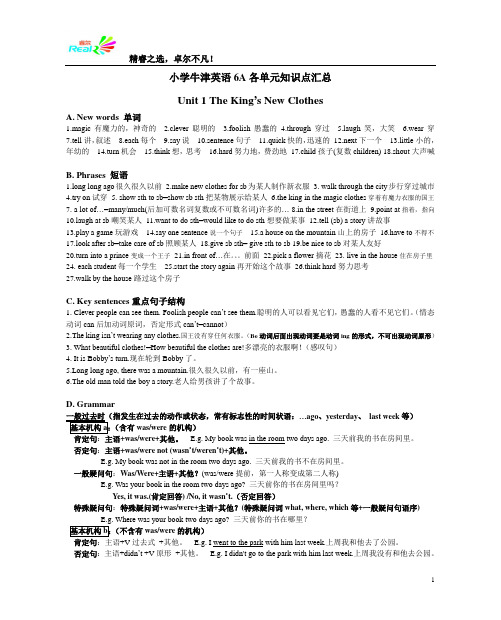
小学牛津英语6A各单元知识点汇总Unit 1 The King’s New ClothesA. New words 单词1.magic有魔力的,神奇的2.clever聪明的3.foolish愚蠢的4.through穿过ugh笑,大笑6.wear穿7.tell讲,叙述8.each每个9.say说10.sentence句子11.quick快的,迅速的12.next下一个13.little小的,年幼的14.turn机会15.think想,思考16.hard努力地,费劲地17.child孩子(复数children) 18.shout大声喊B. Phrases 短语1.long long ago很久很久以前2.make new clothes for sb为某人制作新衣服3. walk through the city步行穿过城市4.try on试穿5. show sth to sb=show sb sth把某物展示给某人6.the king in the magic clothes穿着有魔力衣服的国王7. a lot of…=many/much(后加可数名词复数或不可数名词)许多的…8.in the street在街道上9.point at指着,指向ugh at sb嘲笑某人11.want to do sth=would like to do sth想要做某事12.tell (sb) a story讲故事13.play a game玩游戏14.say one sentence说一个句子15.a house on the mountain山上的房子16.have to不得不17.look after sb=take care of sb照顾某人18.give sb sth= give sth to sb 19.be nice to sb对某人友好20.turn into a prince变成一个王子21.in front of…在。
牛津小学英语6A各单元 知识梳理
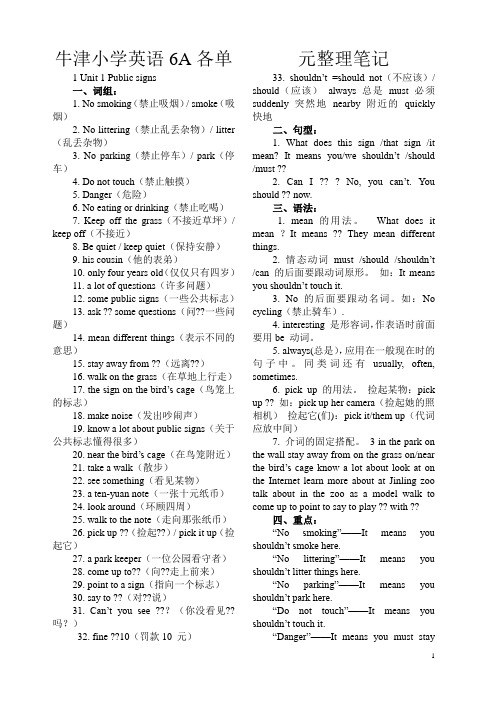
牛津小学英语6A各单元整理笔记1 Unit 1 Public signs一、词组:1. No smoking(禁止吸烟)/ smoke(吸烟)2. No littering(禁止乱丢杂物)/ litter (乱丢杂物)3. No parking(禁止停车)/ park(停车)4. Do not touch(禁止触摸)5. Danger(危险)6. No eating or drinking(禁止吃喝)7. Keep off the grass(不接近草坪)/ keep off(不接近)8. Be quiet / keep quiet(保持安静)9. his cousin(他的表弟)10. only four years old(仅仅只有四岁)11. a lot of questions(许多问题)12. some public signs(一些公共标志)13. ask ?? some questions(问??一些问题)14. mean different things(表示不同的意思)15. stay away from ??(远离??)16. walk on the grass(在草地上行走)17. the sign on the bird’s cage(鸟笼上的标志)18. make noise(发出吵闹声)19. know a lot about public signs(关于公共标志懂得很多)20. near the bird’s cage(在鸟笼附近)21. take a walk(散步)22. see something(看见某物)23. a ten-yuan note(一张十元纸币)24. look around(环顾四周)25. walk to the note(走向那张纸币)26. pick up ??(捡起??)/ pick it up(捡起它)27. a park keeper(一位公园看守者)28. come up to??(向??走上前来)29. point to a sign(指向一个标志)30. say to ??(对??说)31. Can’t you see ???(你没看见??吗?)32. fine ??10(罚款10 元)33. shouldn’t =should not(不应该)/ should(应该)always 总是must 必须suddenly 突然地nearby 附近的quickly 快地二、句型:1. What does this sign /that sign /it mean? It means you/we shouldn’t /should /must ??2. Can I ?? ? No, you can’t. You should ?? now.三、语法:1. mean 的用法。
上海版牛津英语6A知识点整理
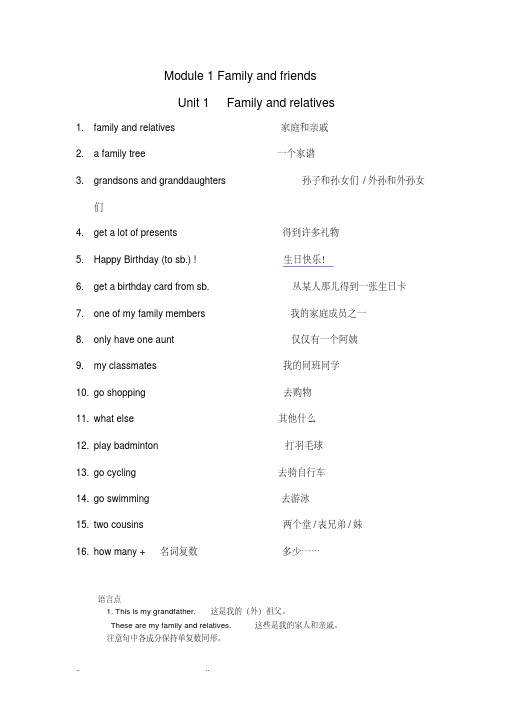
Module 1 Family and friendsUnit 1 Family and relatives1.family and relatives 家庭和亲戚2. a family tree 一个家谱3.grandsons and granddaughters 孙子和孙女们/外孙和外孙女们4.get a lot of presents 得到许多礼物5.Happy Birthday (to sb.) ! 生日快乐!6.get a birthday card from sb. 从某人那儿得到一张生日卡7.one of my family members 我的家庭成员之一8.only have one aunt 仅仅有一个阿姨9.my classmates 我的同班同学10.go shopping 去购物11.what else 其他什么12.play badminton 打羽毛球13.go cycling 去骑自行车14.go swimming 去游泳15.two cousins 两个堂/表兄弟/妹16.how many + 名词复数多少……语言点1. This is my grandfather.这是我的(外)祖父。
These are my family and relatives.这些是我的家人和亲戚。
注意句中各成分保持单复数同形。
2. I?m their son.. 我是他们的儿子。
We?re their sons.我们是他们的儿子。
3. How many uncles do you have?你有多少个叔叔?How many后面接可数名词的复数形式。
4. What do you do with your…?你和你的…干什么?5. What else do you do with your…?你和你的…还干什么?6. What else do you do with your…?你和你的…还干什么?With是个介词,后面接人称代词时,要用宾格的形式。
牛津小学英语6A主要语法知识及单词词组句式

牛津小学英语6A主要语法知识一般过去时:定义:表示过去某个时间发生的动作或存在的状态,常与表示过去的时间状语连用。
如:yesterday,last night ,three months ago,just now,a moment ago,that night 等。
它的肯定形式:I was born in 1995. I watched cartoons last night.它的否定形式:Were you born in 1995? Yes , I was./No, I wasn’t一般疑问形式及肯(否)定回答:Did you watched cartoons last night? Yes, I did./ No ,I didn’t.特殊疑问形式:When were you born? What did you do last night?动词的过去式形式:a:规则动词的过去式词尾变化:1. 一般情况下加ed,如watered,planted2. 以不发音字母e结尾的加d,如:tasted。
liked,lived3. 以辅音字母+y结尾的变y为i,再加ed,study——studied4. 单音节,以一个元音字母和一个结尾的,双写这个辅音,再加ed,如:stop-stoppedb:规则动词的词尾读音:a) 在浊辅音和元音后读/d/,如:pulled ,wateredb) 在清辅音后读/t/,如cooked , milked ,asked , picked, walkedc) 在/t/和/d/音后读/id/,如:collected , tasted , pointed , studiedc:不规则动词的变化没有什么规律,需要大家背熟记牢:is/am–was are-were do-did have/has-had go-went make-made sit-sat get-got see-saw come-came swim-swam put-put eat-ate drink-drank fly-flew buy-bought run-ran drive-drove know-knew meet-met catch-caught ride-rode sing-sang speak-spoke say-said teach-taught take-took think-thought write-wrote give-gave begin-began tell-told hear-heard keep-kept draw-drew 代词分为两种:人称代词和物主代词。
- 1、下载文档前请自行甄别文档内容的完整性,平台不提供额外的编辑、内容补充、找答案等附加服务。
- 2、"仅部分预览"的文档,不可在线预览部分如存在完整性等问题,可反馈申请退款(可完整预览的文档不适用该条件!)。
- 3、如文档侵犯您的权益,请联系客服反馈,我们会尽快为您处理(人工客服工作时间:9:00-18:30)。
牛津小学英语6A知识要点Unit 1 单词:cousin堂(表)兄弟姐妹question问题public公共的 sign标志mean意思是bin箱子danger危险must必须 away(离)开grass草off脱离,(离)开cage笼子quiet安静noise噪声know知道conversation对话complete完全的smoke吸烟litter乱丢cycle骑自行车back回suddenly突然地note钞票,纸币match比赛around在周围,四面nearby附近的keeper看守人 point指出fine罚款rubbish废物,词组:1.禁止停车No parking2.禁止吸烟No smoking3.禁止吃喝No eating or drinking4.禁止践踏keep off the grass5.禁止乱丢杂物No littering6.禁止触摸Do not touch7.安静Keep /Be quiet 8.朝他走去come up to him9.罚款5元FINE ¥5 10.在鸟笼上on the birds’cage11.指向point to 12.只有四岁only four years old13.有许多问题have a lot of questions 14.问问题ask question15.公共标志public signs 16.禁止骑车No cycling17.在危险中in dange r 18.制造噪音make noise19.散步take a walk20.远离stay away from21.一个公园看守员a park keeper 22.环顾look around23.在草地上走walk on the grass 24.进去go in25.建筑物上的标志the sign on the building句型:1.这个标牌是什么意思?What does this sign mean?它意指“危险”。
It means “Danger”.2.那个标牌什么意思? What does that sign mean?它意指你不应该在草地上走。
It means you shouldn’t walk on the grass.3.它是什么意思?What does it mean?它意指你应该远离建筑物。
It means you should stay away from the building.4.我现在可以看电视了吗?Can I watch TV now?不,你不可以。
你应该先做你的家庭作业。
No, you can’t. You should do your homework first. 5.杰克只有四岁,但他总是有许多问题要问。
Jack is only four years old, but he always has a lot of questions.6.他正在问本一些有关公共标志的问题。
He is asking Ben some questions about public signs.7.我可以进去吗? Can I go in?不,你不可以。
你必须远离这座建筑物。
No, you can’t. You should stay away from the building.部分语言点解析1.动词如果在No后表示禁止做某事,动词要用ing形式,如:No swimming;如果前面是don’t 或者do not后面跟动词原形,如:Do not touch.2.must, would, should (shouldn’t), can,may的区别must 表示必须一定做到的事情;would表示想要做的事情,would like to do sth.should(shouldn’t)表示应该或不应该;can表示能够,会做某事;may表示可以或允许做某事。
must, should shouldn't, can, may都是情态动词,后面都跟动词原形。
Unit 2单词:Birthday生日 date日期 when何时 as作为present礼物VCD影视光碟Aladdin阿拉丁Let’s wait and see让我们等着瞧doorbell门铃candle蜡烛costume全套服饰blow out 吹灭second第二 third第三fourth第四fifth第五 sixth 第六twelfth第十二twentieth第二十twenty-first第二十一 January一月February二月March三月 April四月 May五月 June六月 July七月August 八月September九月October十月November十一月 December十二月词组:1.本的生日Ben’s birthday2.一起回家go home together3.十月16号 the sixteenth of October4.拜访某人visit somebody( sb.)5.谈论某事talk about something (sth.)6.和某人谈话talk to/with somebody(sb.)7.日本卡通片Japanese cartoons 8.作为一个生日礼物as a birthday present9.举行生日聚会have a birthday party 10.祝你生日快乐Happy birthday to you !11.等会儿看wait and see 12.脱掉你的鞋take off your shoes13.吹灭蜡烛blow out the candles 14.在本的生日聚会上at Ben’s birthday party15.通过电话on the phone 16.一个大生日蛋糕a big birthday cake17.做张生日贺卡make a birthday card 18.一张纸a piece of paper19.在海湾in the bay 20.中国的新年Chinese New Year21.在日历上on the calendar 22.马上到come soon23.一张纸 a piece of paper 24.写信息write a message25.一大早early in the morning句型:1)今天几号? What date is it today?今天是九月二十三号。
It’s the twentieth-third of September.2)你何时过生日? When’s your birthday?我的生日是十月十八号。
My birthday’s on the eighteenth of October.3)你想要什么东西作为生日礼物?What would you like as a birthday present?我想要一个日本卡通片的光盘。
I’d like a VCD of Japanese cartoons.5)你们经常举行生日聚会吗? Do you often have a birthday party?6)本正和他的家人讨论关于他的生日聚会的事。
Ben is talking to his family about his birthday party.8)本吹灭了蜡烛上的蛋糕。
Ben blows out the candles on the cake.9)阿拉丁正脱掉他的戏服。
Aladdin is taking off his costume.部分语言点解析(1)I’d like=I would like我想要某物 === I want…I’d like to = I would like to 我想要做某事 == I want to …would like想要的意思。
可用于表示邀请,后面如果加动词用would like to+动词原形例1.I’d like some balloons. →Would you like some balloons?=I want some balloons . → Do you want some balloons ?2. I’d like to watch TV . → Would you like to watch TV?=I want to watch TV . → Do you want to watch TV?(2)介词in. on at的用法in表示:“段”时间,常用在年份,月份,季节前,也用在上午,下午和晚上前。
例如:in 1997在1997年in spring在春季in May在五月in the moring在上午in the afternoon在下午in the evening在晚上on表示具体的某一天,常用在星期,具体的一天前。
例如:on Monday 在星期一on the first of March在三月一日at用在时刻前例如:at ten o'clock在十点钟Unit 3单词:was (am,is的过去式) excited激动的,兴奋的monent片刻,瞬间ago以前were(are的过去式)glasses眼镜camera照相机CD Walkman光盘随声听roll卷,卷状物film胶卷ground地面exciting令人激动的,令人兴奋的earphone耳diary日记,日记簿remember记住,记得weren’t = were notmobile phone手机,手提电话race比赛词组:1.Sports Day体育运动日2. all the students所有的学生3.watch a running race观看赛跑4.very excited非常的兴奋5.look for 寻找6. very exciting非常的令人兴奋7.a moment ago一会儿前 8.let me see让我看看9.just now刚才 10.on the ground在地上11.pick them up把它们捡起来 12. can’t find找不到13.want to know想知道 14.behind the door在门后面15.a pair of glasses一副眼镜 16.a roll of film 一卷胶卷17.beside the copybooks on your desk在你桌子上的抄写本旁18.try to remember试着记住句型:1.Where’s my diary? It’s on the desk. It isn’t there now. It was there a moment ago.我的日记在哪里?它在课桌上。
